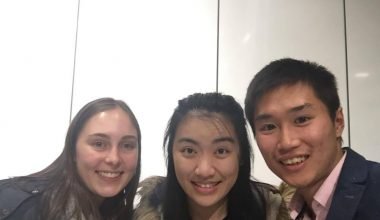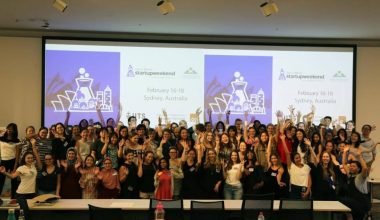I have Enactus to thank for introducing me to the concept of a ‘hackathon’ and the world of social entrepreneurship. This really kickstarted my interest in learning more. I can’t believe I hadn’t heard about it before!
This being the first time I participated in a hackathon, there was a huge learning curve. But it was a really rewarding experience and opened my eyes to a whole new world.
The idea: a diary that gives high school students career ideas

My team came up with the concept of a career diary for disadvantaged high school students to expose them to the myriad of opportunities available after graduation.
Like many ideas, the final product wasn’t the first iteration.
One of my team members had initially pitched an environmentally-friendly yet aesthetically pleasing diary. Our initial discussions were focused too much on the features of the diary. Would it be blank or have lines? Would there be prompts to help students maintain their mental health?
Basically, we were shaping the solution to try and fit a problem that we hadn’t clearly defined. Of course, at that point, we didn’t know much about the lean startup or design thinking process, so we could be forgiven for being fixated on the idea (solution) and not really grasping the problem.
On top of this, we had a bunch of mentors visit our group in quick succession. Just 10 minutes after we’d digested the opinion and advice of one mentor, another one would come along and give us completely different advice.
Key learning: Don’t change your idea to sit well with every mentor’s opinion!
Focus on staying true to your vision and make your own judgment calls.
My team got swept up in the tide of mentors coming one after another and changed our idea about 100 times. This left us lost, confused and frustrated.
One key issue is that we didn’t actually have a ‘vision’ to stay true to. We were too focused on the solution/product.
As every entrepreneur will know, you need to start with the problem that you’re trying to solve. Given that this was my first taste of business ideation, I didn’t know that back then.
I’ve also learned over time that it doesn’t matter what opinions people have about your idea. The most important thing is to test it with your target audience through customer interviews. They’re the ones whose opinion matters because you want to be solving their problem.
Our final idea was put together just hours before the pitch, and we were down one team member.
Needless to say, it was stressful.
It was evident from the judges’ questioning that we hadn’t thoroughly understood our target market (high school students).
Nonetheless, we did quite well for our pitch given the circumstances, and this first foray into the space led me to take up many more opportunities to come.
Check out my other hackathon experiences here.






